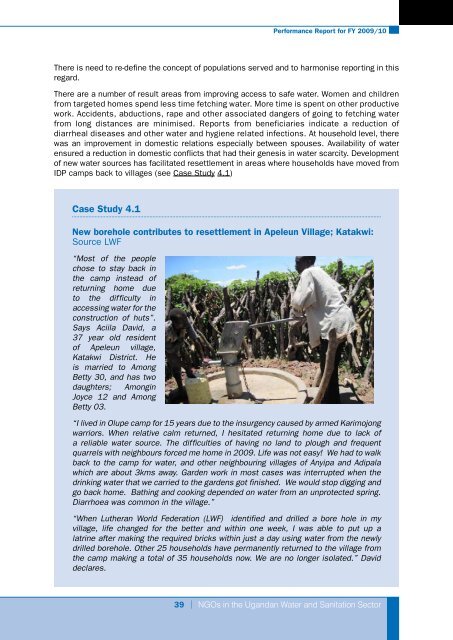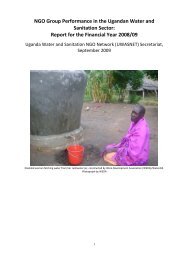Performance Report for FY 2009/10 - UWASNET
Performance Report for FY 2009/10 - UWASNET
Performance Report for FY 2009/10 - UWASNET
Create successful ePaper yourself
Turn your PDF publications into a flip-book with our unique Google optimized e-Paper software.
<strong>Per<strong>for</strong>mance</strong> <strong>Report</strong> <strong>for</strong> <strong>FY</strong> <strong>2009</strong>/<strong>10</strong><br />
There is need to re-define the concept of populations served and to harmonise reporting in this<br />
regard.<br />
There are a number of result areas from improving access to safe water. Women and children<br />
from targeted homes spend less time fetching water. More time is spent on other productive<br />
work. Accidents, abductions, rape and other associated dangers of going to fetching water<br />
from long distances are minimised. <strong>Report</strong>s from beneficiaries indicate a reduction of<br />
diarrheal diseases and other water and hygiene related infections. At household level, there<br />
was an improvement in domestic relations especially between spouses. Availability of water<br />
ensured a reduction in domestic conflicts that had their genesis in water scarcity. Development<br />
of new water sources has facilitated resettlement in areas where households have moved from<br />
IDP camps back to villages (see Case Study 4.1)<br />
Case Study 4.1<br />
New borehole contributes to resettlement in Apeleun Village; Katakwi:<br />
Source LWF<br />
“Most of the people<br />
chose to stay back in<br />
the camp instead of<br />
returning home due<br />
to the difficulty in<br />
accessing water <strong>for</strong> the<br />
construction of huts”.<br />
Says Aciila David, a<br />
37 year old resident<br />
of Apeleun village,<br />
Katakwi District. He<br />
is married to Among<br />
Betty 30, and has two<br />
daughters; Amongin<br />
Joyce 12 and Among<br />
Betty 03.<br />
“I lived in Olupe camp <strong>for</strong> 15 years due to the insurgency caused by armed Karimojong<br />
warriors. When relative calm returned, I hesitated returning home due to lack of<br />
a reliable water source. The difficulties of having no land to plough and frequent<br />
quarrels with neighbours <strong>for</strong>ced me home in <strong>2009</strong>. Life was not easy! We had to walk<br />
back to the camp <strong>for</strong> water, and other neighbouring villages of Anyipa and Adipala<br />
which are about 3kms away. Garden work in most cases was interrupted when the<br />
drinking water that we carried to the gardens got finished. We would stop digging and<br />
go back home. Bathing and cooking depended on water from an unprotected spring.<br />
Diarrhoea was common in the village.”<br />
“When Lutheran World Federation (LWF) identified and drilled a bore hole in my<br />
village, life changed <strong>for</strong> the better and within one week, I was able to put up a<br />
latrine after making the required bricks within just a day using water from the newly<br />
drilled borehole. Other 25 households have permanently returned to the village from<br />
the camp making a total of 35 households now. We are no longer isolated.” David<br />
declares.<br />
39 | NGOs in the Ugandan Water and Sanitation Sector



